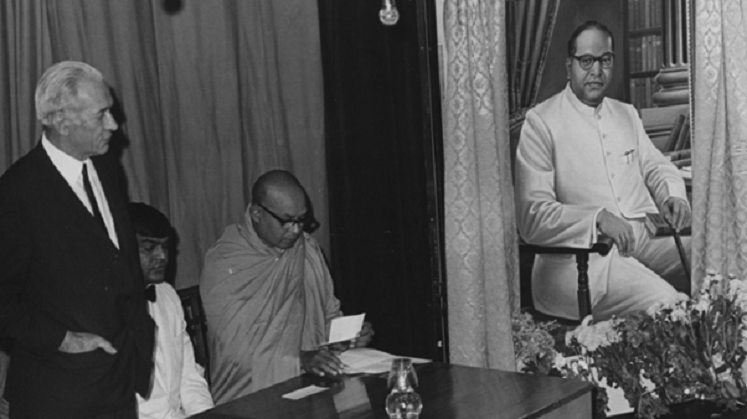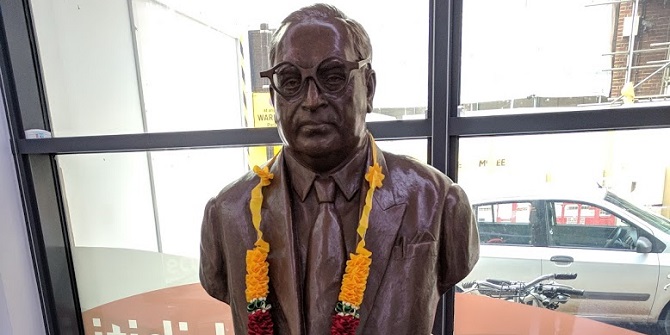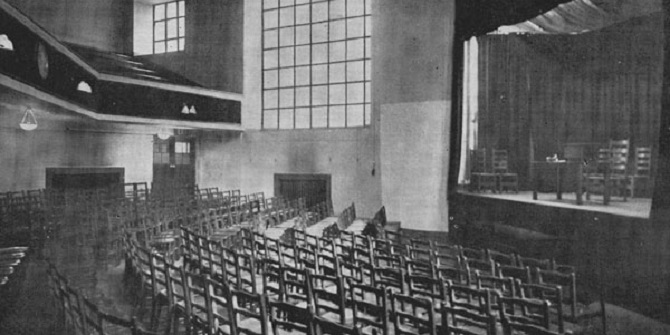The editors and authors of the recently published book, Ambedkar in London, spoke at a book launch in front of an audience in LSE’s Sheikh Zayed Theatre. LSE alumnus Dr Bhimrao R Ambedkar (1891-1956) was one of India’s greatest intellectuals and social reformers; his political ideas continue to inspire and mobilise some of the world’s poorest and most socially disadvantaged, in India and the global Indian diaspora. Ambedkar’s thought on labour, legal rights, women’s rights, education, caste, political representation and the economy are international in importance.
Ambedkar in London explores his lesser-known period of London-based study and publication during the early 1920s, presenting that experience as a lens for thinking about B R Ambedkar’s global intellectual significance. Some of his later canon on caste, and Dalit rights and representation, was rooted in and shaped by his earlier work around the economy, governance, labour and representation during his time as a law student and as a doctoral candidate at the London School of Economics and Political Science (LSE).
Ambedkar at LSE
Speaking specifically about Ambedkar’s time as a student at LSE, former LSE archivist Sue Donnelly began with an introduction to the world Ambedkar inhabited when he was here. What we now know as the Old Building was still new. LSE was small, specialist, young, and – for the time – it had a strong and unique focus on research.
Indian students at LSE in the 1920s found a supporter in academic Vera Anstey who had returned to LSE after a spell in India with husband Percy, Principal at Sydenham College, Mumbai. LSE itself was a very international environment to be in. Between 1845 and 1932 there were 130 students from the Indian subcontinent and there were 44 other Indian students while Ambedkar was at LSE. In 1912 the Students’ Union had its first Indian Chair and in 1920, student Mithan Tata was chosen to take part in the ceremony for the foundation stone of the Old Building.
Ambedkar arrived at LSE in 1916 from New York. He attended four taught courses but according to his student files didn’t always turn up. He was keenest on the lesson taught by L T Hobhouse and possibly wanted to develop his broader thinking on sociology and anthropology. He returned in 1920 and was awarded his MSc in 1921, beginning work on his DSc thesis. This was conferred in November 1923. It was initially rejected – we only have the records from his student file, and the correspondence within doesn’t confirm or deny whether this was because of his anti-imperial stance.
Why choose LSE? It had a focus on economics and research and was open to Indian students. Postgraduate students undertaking research was a very recent concept. PhDs had only been introduced in 1919 and DScs in the 1860s. Ambedkar finished his thesis within two years which, coupled with the fact that he is not featured in any surviving student photographs or in the student magazine, suggests he focused on his research. His supervisor was Professor Edwin Cannan, known for his part in choosing LSE’s coat of arms, and also the University of London’s first Professor of Political Economy. Cannan noted that Ambedkar was an exceptional student.
This public event was co-hosted by LSE Library, Department of Anthropology and International Inequalities Institute. It was held in the Sheikh Zayed Theatre, Cheng Kin Ku Building, on Wednesday 11 October 2023. The introduction and first 10 minutes of the programme are cut out due to technical issues.
The event was chaired by Tarun Khaitan, Professor (Chair) of Public Law at LSE Law School and Honorary Professorial Fellow at Melbourne Law School. The speakers were: Santosh Dass, Chair of the Anti Caste Discrimination Alliance, and President of the Federation of Ambedkarite and Buddhist Organisations UK; Sue Donnelly, former LSE archivist with responsibility for the development of LSE’s institutional archive and raising awareness of the School’s unique and fascinating history; William Gould, Professor of Indian History at the University of Leeds; Christophe Jaffrelot, Avantha Chair and Professor of Indian Politics and Sociology at the King’s India Institute.
Visit our collection of blogs on B R Ambedkar and LSE.
To view Ambedkar’s student file and other related material, head to the LSE Library’s Traces of South Asia webpage.






J Bhim, Very pleased to read your piece about your journey to LSE. We accommodated you all at our annual event at the High Commission of India on 14th April at the very short notice. Due to shortage of time, we could not talk to you personally. Please keep in touch. C Gautam Joint Secretary Federation of Ambedkarite and Buddhist Organisations UK E: cgautam@ambedkar.org.uk